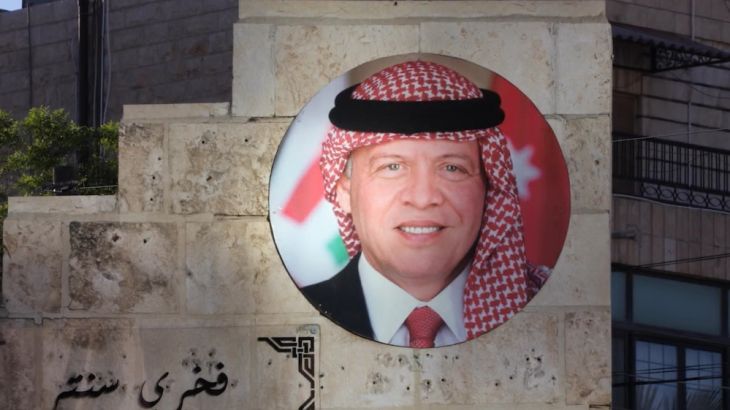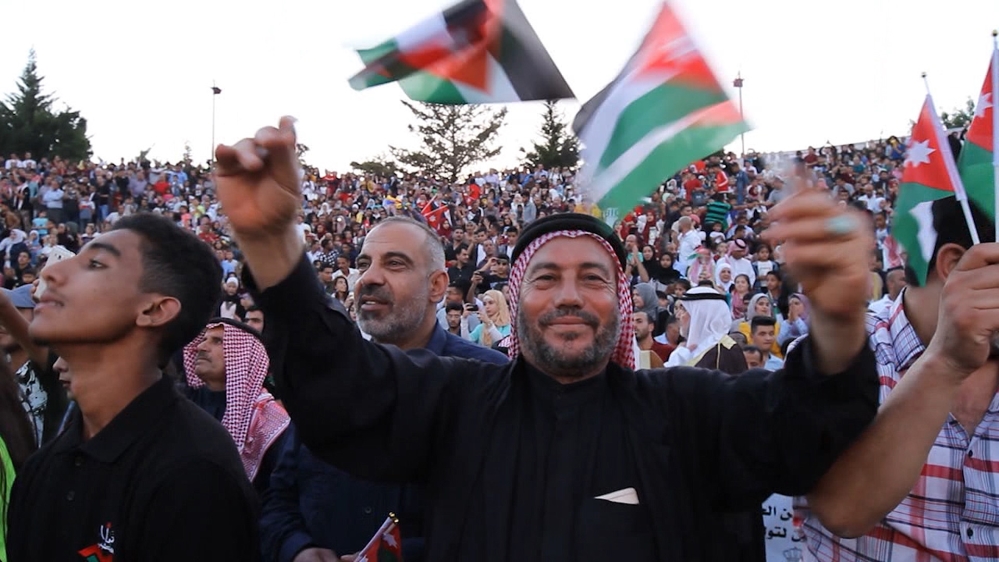
Jordan’s Angry Tribes
Why have Jordan’s powerful tribes been putting pressure on King Abdullah and the country’s ruling royal family?
Jordan and its Hashemite monarchy have long been regarded as stable fixtures in a region often beset by political uncertainty.
But King Abdullah II is under growing pressure to reboot a struggling economy, institute constitutional reform, and stand firm against a controversial US-Saudi scheme, the so-called “Deal of the Century” to resolve the Israeli-Palestinian conflict.
Keep reading
list of 4 items‘Crimes against humanity’ may have been committed in Sudan, says UN chief
The Take: How Iran’s attack on Israel unfolded
Europe pledges to boost aid to Sudan on unwelcome war anniversary
We sent filmmakers Mariam Shahin, Nada Issa and George Azar to find out why these pressures are becoming difficult for the government to ignore and what effect they are having on the kingdom’s delicate demographic balance – between increasingly angry members of its indigenous tribes, known as “East Bankers”, and Palestinians who have fled here in the past six decades and become citizens.
FILMMAKER’S VIEW
By Mariam Shahin
On June 9, 2019, King Abdullah II of Jordan marked the 20th anniversary of his ascension to the Hashemite throne. For months, the government organised events with singers, musical bands, and Bedouin sword dancing to encourage celebrations.
But Jordanians as a whole feel wary about their future as a nation and overall enthusiasm of any kind remains muted.
Constant inflation, an approximately $30bn national debt and a 40 percent youth unemployment rate have strained relations between the government and the people.
Among the groups most severely affected are public sector employees, who face stagnant income and job cuts. These employees have often been “East Bankers” of tribal origin, and thus the country’s indigenous people. While this group now represents an actual minority within the state, they have long been seen as “kingmakers” – whose support of the monarchy and state has been sought out by both King Abdullah II and his father before him, the late King Hussein.
Jordanians complain primarily of economic deprivation, combined with their own increasing irrelevance in how the country is run and by whom. They point to the national debt as “proof” of corruption – for which they blame the government, political elites and sometimes the monarch himself. They are demanding a greater share in “real” power and decision-making processes.
Many point fingers at mostly American-educated royal advisers who have been pushing for higher taxes and a gradual dismantling of Jordan’s militarised welfare state, which has afforded jobs and income to the kingdom’s indigenous tribes and minorities for decades.

They say this form of “brutal capitalism” devoid of a socioeconomic safety net has torpedoed hopes for widespread developmental growth in the country and turned Jordan from a once food-self-sufficient nation to one dependent on imports and external aid.
Protests demanding changes to one or all of these policies now take place almost every week in the capital, Amman and other cities on the periphery.
The government has responded but not in the way demonstrators would like. After a cabinet reshuffle and the appointment of new security chiefs in May 2019, arrests and intimidations of tribal and political activists have been stepped up.
Shifting regional ties
The Jordanian tribal relationship to the monarchy dates back to 1917 when the Hashemite Dynasty came to a power-sharing agreement. Its legitimacy in Jordan and elsewhere in the Muslim world results from their lineage, which they trace back directly to the Prophet Mohammed through his daughter, Fatimah.
The “understanding”, which survived past the end of British colonial rule in 1946, was that the Hashemites would be kings in consultation with the Tribal Chiefs and in cooperation with the merchant and administrative classes.
The United States, which has depended on Jordan for decades as a source of regional intelligence and security coordination, as well as a training and military base for regional policing and rebel forces ... appears to be reassessing the relationship.
Recently though, Jordan’s leadership has come under intense and unprecedented political and economic pressure since US president Donald Trump came to office. The United States – which has depended on Jordan for decades as a source of regional intelligence and security coordination, as well as a training and military base for regional policing and rebel forces, mainly Iraqis and Syrians – appears to be reassessing the relationship.
Jordan signed a peace agreement with US-allied-Israel in 1995, after decades of adversity and war, but the Trump administration has recently pivoted much closer to Israel and relies more and more on Saudi Arabia and the United Arab Emirates (UAE) for its world view on the Middle East.
This “sidelining” shocked and dismayed both the leadership and the Jordanian people. The long-standing view has been that decades of pragmatic foreign policy have bought them security and some measure of prosperity. Now that is in doubt.
Many of Jordan’s woes are related to the Palestinian question and Jordan’s special status in the Islamic world. When Israel was created, absorbing over 50 percent of historic Palestine in 1948, Jordan became the governmental guardian and overseer of much of what was left – namely occupied East Jerusalem and the occupied West Bank.
Jordan took in the Palestinians that had fled those territories from Israeli occupation, but it also meant they benefited from the more developed economic resources of the West Bank in tourism, agriculture and commerce.
At the same time, Jordan and the Hashemite family also formally assumed responsibility for Islamic and Christian holy sites in Jerusalem – reinforcing their historic relationship as both guardians of Islam and “protectors” of Middle East Christian heritage.
Following the Israeli military occupation of the West Bank and Jerusalem in 1967, Jordan lost governing powers but retained this religious guardianship and a role in education. All this is important background to consider when examining the effect a US and Saudi-backed “economic plan” to resolve the Israeli-Palestinian conflict might have on Jordan.
‘Jerusalem is our red line’
Every year, the US contributes around $1bn to Jordanian coffers – around 70 percent of all the foreign aid the kingdom receives. But much of that is now “on hold”, pending Jordan’s acquiescence to the so-called Deal of the Century.
Presented to a regional summit in Bahrain on June 25-26, 2019, the plan promises $50bn in aid to those who support it, with around $7bn of that supposedly directed towards Jordan. The money is ostensibly to take the sting out of absorbing its large influx of refugees – which, if you combine those of Palestinian origin with a substantial number of more recent Syrian arrivals, comes to around 3,5 million people – roughly a third of the country’s total population of over nine million.
The plan has been greeted with not inconsiderable derision by many Jordanians. $7bn seems sizeable, say observers and decision-makers, but it is little when compared with a long-term change of demography and responsibility that it would entail. What wasn’t officially stated in Bahrain – but what Jordanian politicians believe to be the case – is that Jordan would also be required to take in more West Bank Palestinians, settle them and give them citizenship. This will further strain the economy and resources and turn indigenous Jordanians into an even smaller minority in their own country.

King Abdullah II has responded with a nationwide campaign, rejecting any option that Jordan will be turned into an alternative Palestinian homeland, and doing his best to placate East Bank fears. He has also put great emphasis on the aforementioned Hashemite/Jordanian role as guardians of Muslim and Christian Jerusalem, with the mantra “Jerusalem is our red line”.
Needless to say, Jordanian tribes believe they would be among the biggest losers of the plan and vehemently oppose it – siding with their monarch, strangely enough, just at the moment when more popular discontent over transparency and the economy was seemingly on the rise again.
But recent events have left both East Bank and West Bank Jordanians feeling that the country needs to seek out a more diverse set of alliances and supporters, both regionally – such as Turkey, Iran and Qatar, whose full potential has not yet been tapped – and internationally with Russia, China, India and the European Union. Only this, they feel, will break Jordan’s strangling dependency on the US and Saudi Arabia and avoid forcing them to acquiesce to policies with which few Jordanians feel comfortable.
In the meantime, there is also a growing acknowledgement that Jordan has to diversify its commercial sector and do something about the country’s endemic corruption, which chokes off sustainable and effective development and makes a sham of attempts to remodel the creaking economy. And for all this to take place, the government’s opponents insist, constitutional reform and greater political freedoms are crucial too, because punitive state responses to criticism and the suppression of free speech make it difficult to have effective public debate about how Jordan and its monarchy can change.
As this film shows, the clamour of voices calling for change is getting louder. Bedouins, farmers and urban activists are all now demanding reforms from their monarch and won’t go away. This, added to the mix of the possibly toxic consequences of a US-Saudi plan to solve the Israeli-Palestinian conflict, means you have challenges that the Hashemite administration will have to struggle hard to overcome.
Jordan and its king are at a crossroads. Which way they turn is crucial to the country’s future.